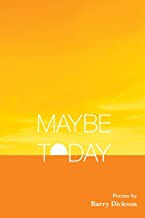by Andrew K. Clark
 TITLE: MAYBE TODAY
TITLE: MAYBE TODAY
AUTHOR: Barry Dickson
PUBLISHER: Cherry Grove Collections
PRICE: $16.00
https://www.cherry-grove.com/barry_dickson.html
It’s not often a book of poetry will make you laugh out loud. Perhaps it’s an unfair generalization, but poets are not known for their humor. Barry Dickson’s new poetry collection, Maybe Today, is full of poems commenting with wit on the ridiculousness of life’s experiences, finding humor even in darker subjects. The opening poem, “The Adverbial World of Match.Com” makes light of how those looking for love online will brandish adverbs to describe themselves, using words like “partly,” “slightly,” or “extremely”:
You mention several times you never.
Forgive me, please, I’d like someone
who at least occasionally.
And frankly, even at my age,
I wouldn’t mind a mate who often.
Then there’s the poem “Dear Citibank,” which mocks the world of gratuitous credit card solicitation letters, which perpetually extend “Last Chances” for their bountiful offers:
Thank you for the warning that this was my “Last Chance!” to take
advantage of your 0% credit card offer…I truly hope my
most recent last chance was not my last last chance, something I have
dreaded ever since my first last chance.
Dickson, who worked as a Creative Director on Madison Avenue in New York for thirty-five years, believes in the power of humor, and in the power of poetry itself, to heal. In the poem “Prescription,” Dickson suggests the reader try poetry to address the difficulties of the human condition, a straight enough premise. But Dickson can’t help himself, hilariously cataloging a list of side effects akin to what we see in a pharmaceutical advertisement:
Those who are pregnant or could become pregnant
should read poetry with caution. Poetry can cause
you to do things that might make you pregnant…
Poetry can alter the shape of your heart…
Poetry makes people see things that aren’t really there.
Of this notion, as to whether poetry can or should be funny, in the poem “At the 92nd St. Y” Dickson asks “Does a belly laugh come from a / shallower place than a tear?” But in Maybe Today, Dickson isn’t content to just make us laugh. There are many poems which address love and love lost. My favorite of these is “Pillow Talk,” where the poet describes a relationship that was once beautiful, now only a memory:
I have not changed the pillowcases since you left
six weeks ago, just to keep your scent around.
In “Ode to Snow,” as the snow covers the world, it transforms simple objects into other things. The poet longs for it to blanket a lamppost and turn it into a woman.
I will open up to her and love her
even though I know
she will leave me in the spring.
Beyond love and laughter, life is full of graver concerns. This collection features poems treating human trafficking, sexism, the environment, racism, and antisemitism. Some themes are drawn from the author’s own personal experience. Dickson once described moving into a neighborhood where his was the only Jewish family. They were harassed for their heritage and beliefs, the neighbors going so far as to sign their names to a petition to keep Jews out of the neighborhood. Later, strangely, one of the neighbors brought the family a bushel of pears as a peace offering. In “He’s Right,” Dickson talks about the lingering effects of violence against Jews in the Holocaust, and the insidiousness of Holocaust-deniers.
When you kill a child, you kill his children too,
and the children of their children.
They say six million died,
but by now it must be 25, soon it will be 30.
When you kill a child, the killing
never ever ever stops.
Perhaps no other poem in the collection speaks to the friction between the humanity of laughter and the world’s ugliness than the title poem “Maybe Today.” The poet speaks of how each day we, as humans, are given the optimism of morning. The sun returns each day, again and again, bringing hope and possibility. To be sure, there are dark days in between. The poet hopes for days absent racial violence, terrorism, homophobic violence, and human trafficking. The poem is dedicated to David Rodriguez Ritcheson, a sixteen-year-old Mexican-American who was beaten by two white teenagers for talking to their sister. Ritcheson later committed suicide.
soon the great optimist, morning
will give it another try.
Maybe today will be the day
no one is dragged behind a truck
because he’s black
or kicked to death because he’s gay
the day no man imprisons a girl…
The closing poem in the collection, “Barry Dickson 1945-” asks the reader to think about mortality using the frame of an obituary heading. On the day we’re born, Dickson tells the reader, we all get a year and a dash stamped beside our names by a county clerk. No matter who we are, or where we’re born, at some point, someday, someone will close the dash. But in true Dickson style, even as he asks us to contemplate our own deaths, he can’t help but slip in a touch of wry humor.
So long as there is an empty space to the right of your dash, enjoy.
Live, love, learn. And be nice to that other guy.
Because no matter who he is or what he’s done,
no matter who you are or who you think you are,
I can assure you, with absolute certainty, that you both have a dash
and a very willing county clerk.
—
 Andrew K. Clark is a writer from Asheville, NC. His poetry collection, Jesus in the Trailer, was published by Main Street Rag Press. His work has appeared or is forthcoming in The American Journal of Poetry, UCLA’s Out of Anonymity, Appalachian Review, Rappahannock Review, and The Wrath Bearing Tree. He is a recent MFA graduate from Converse College. Connect with him at andrewkclark.com.
Andrew K. Clark is a writer from Asheville, NC. His poetry collection, Jesus in the Trailer, was published by Main Street Rag Press. His work has appeared or is forthcoming in The American Journal of Poetry, UCLA’s Out of Anonymity, Appalachian Review, Rappahannock Review, and The Wrath Bearing Tree. He is a recent MFA graduate from Converse College. Connect with him at andrewkclark.com.